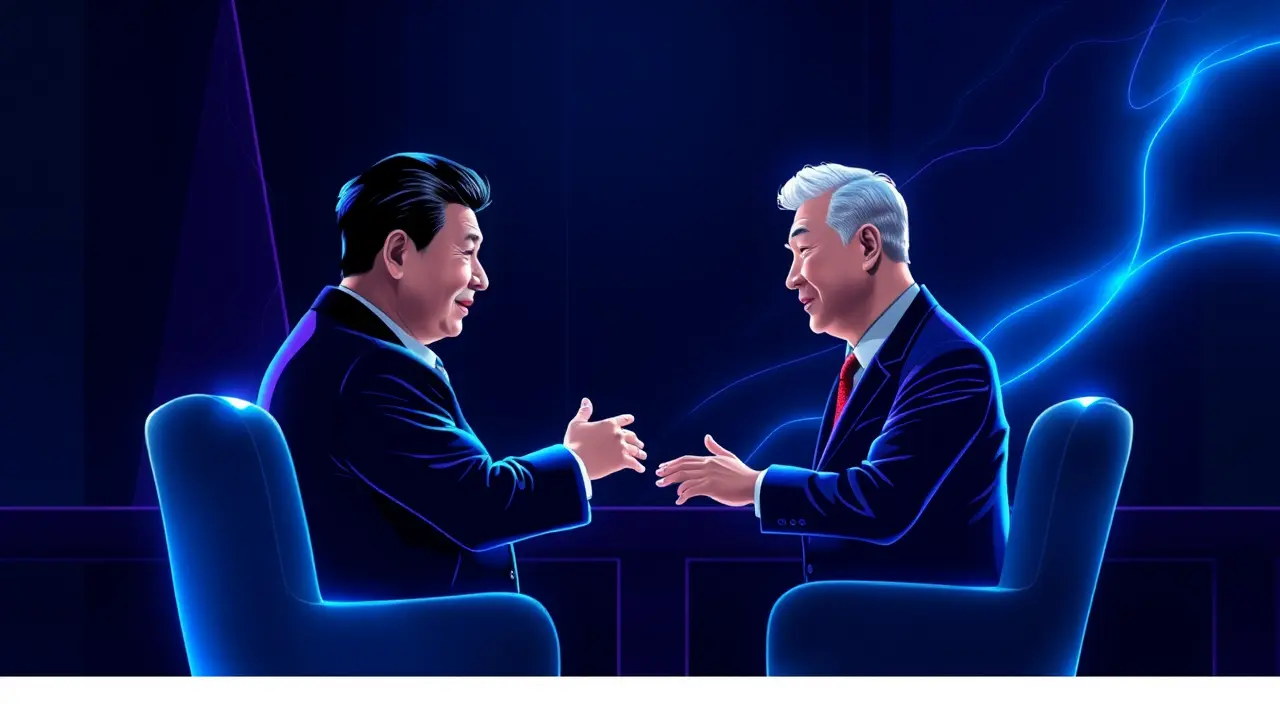
PoliticsdiplomacyBilateral Relations
Xi Urges Stable Japan-China Relations in APEC Meeting.
RO
Robert Hayes
2 days ago7 min read
In the hushed corridors of power at the Asia-Pacific Economic Cooperation summit in Gyeongju, a significant diplomatic encounter unfolded, one that veteran observers of international relations would immediately recognize as possessing the delicate weight of history. Chinese President Xi Jinping, in his first formal meeting with Japan's newly inaugurated Prime Minister Sanae Takaichi, delivered a masterclass in calibrated statecraft, a thirty-minute discussion that sought to recalibrate a relationship perpetually balanced on a knife's edge between cooperation and conflict.Xi’s central thesis, that conflicts and disagreements should not be allowed to define the bilateral ties, is not merely a diplomatic pleasantry; it is a strategic imperative echoing the realpolitik of bygone eras, reminiscent of the fraught but necessary dialogues between Cold War adversaries who understood that mutual destruction was the only alternative to managed competition. The setting itself is symbolic—APEC, a forum designed for economic collaboration, often becomes the stage for the most sensitive political dialogues, where the unspoken tensions over Taiwan, the East China Sea, and historical grievances form the subtext of every handshake and prepared statement.For Prime Minister Takaichi, a figure known for her conservative stance on defense and historical issues, this initial face-to-face with the paramount leader of China was a critical test, a moment to establish a personal channel while navigating the entrenched institutional suspicions between Tokyo and Beijing. The call for a 'correct understanding of China' is a recurring motif in Xi’s foreign policy lexicon, a demand for recognition on its own terms, which in the context of Japan carries the ghosts of a tumultuous past and the stark realities of a present where Japan is deepening its security ties with the United States as a direct counterbalance to Chinese assertiveness.One must analyze this through the lens of Churchill, who famously opined that 'to jaw-jaw is always better than to war-war. ' This meeting is the essence of jaw-jaw, an effort to maintain open channels even as both nations modernize their militaries and engage in fierce competition for technological and economic supremacy across the Indo-Pacific.The broader context is a global landscape of fragmentation, where supply chain resilience has become a national security mantra in Tokyo, often translating to 'de-risking' from China, while Beijing views the U. S.-Japan-South Korea trilateral cooperation with deep suspicion, seeing it as a nascent Asian NATO aimed at containment. Expert commentary from seasoned diplomats in the region suggests that while these summits rarely yield immediate breakthroughs, their value lies in crisis prevention—establishing red lines and protocols to avoid a catastrophic miscalculation in the contested waters surrounding the Senkaku/Diaoyu Islands, a flashpoint that could draw in the United States through its mutual defense treaty with Japan.The possible consequences of failure are stark: an accidental collision or an unauthorized entry escalating into a conflict that would shatter regional stability and cripple the global economy, given that China and Japan are the world's second and third largest economies, deeply intertwined in a complex web of trade and investment. Conversely, a stable, if competitive, relationship allows for cooperation on transnational issues like climate change and pandemic response, proving that even rivals can find islands of common interest in a sea of disagreement. The analytical insight here is that Xi’s overture is likely a tactical maneuver, an attempt to probe for fissures in the unified front presented by Japan and its allies, while for Japan, it is a necessary exercise in dual-track engagement—standing firm on principles of a Free and Open Indo-Pacific while keeping the door to dialogue ajar, a delicate dance that will define the geopolitical architecture of Asia for decades to come.
#featured
#Xi Jinping
#Sanae Takaichi
#Japan-China relations
#APEC summit
#diplomacy
#bilateral ties
Stay Informed. Act Smarter.
Get weekly highlights, major headlines, and expert insights — then put your knowledge to work in our live prediction markets.
Related News
Comments
It’s quiet here...Start the conversation by leaving the first comment.
© 2025 Outpoll Service LTD. All rights reserved.













